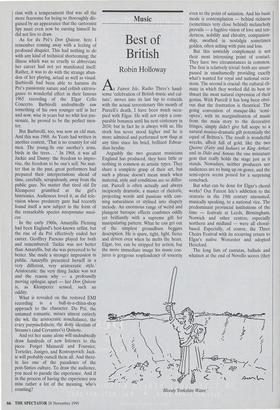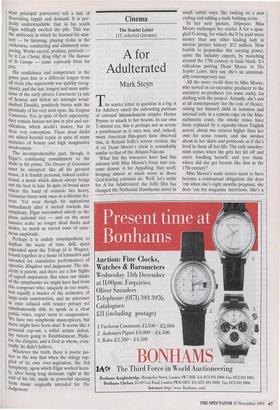Music
Best of British
Robin Holloway
Fairest Isle, Radio Three's hand- some 'celebration of British music and cul- ture', moves into its last lap to coincide with the actual tercentenary this month of Purcell's death, I have been much occu- pied with Elgar. He will not enjoy a com- parable bonanza until his next centenary in 2034; but in fact he is always with us. His stock has never stood higher and he is more admired and performed now than at any time since his brief, brilliant Edwar- dian heyday.
Arguably the two greatest musicians England has produced, they have little or nothing in common as artistic types. They share a complete grasp of their art, but such a phrase doesn't mean much when material, style and conditions are so differ- ent. Purcell is often actually and always incipiently dramatic, a master of rhetoric, projecting words and passions with cun- ning naturalness or stylised into shapely melody. An enormous range of weird and plangent baroque effects combines oddly yet brilliantly with a supreme gift for manipulating pattern. What he can get out of the simplest groundbass beggars description. He is spare, tight, light, fierce and driven even when he melts the heart. Elgar, too, can be stripped for action, but the more immediate image his music con- jures is gorgeous resplendency of sonority even to the point of satiation. And his basic mode is contemplation — behind richness (sometimes very close behind) melancholy prevails — a fugitive vision of love and ten- derness, nobility and chivalry, companion- ship, swathed in nostalgia sometimes golden, often aching with pain and loss.
But this unwieldy complement is not their most interesting point of contact. They have two circumstances in common. The first is relatively trivial: both are unsur- passed in unashamedly providing exactly what's wanted for royal and national occa- sions. The second is crucial: the cultural cli- mate in which they worked did its best to thwart the most natural expression of their genius. With Purcell it has long been obvi- ous that the frustration is theatrical. The going convention of masque-like 'semi- opera', with its marginalisation of music from the main story to the decorative fringes, simply didn't give full scope to a natural musico-dramatic gift potentially the equal of Britten's. The result is wonderful wrecks, albeit full of gold, like the two Queens (Fait)? and Indian) or King Arthur; and in Dido and Aeneas the one miniature gem that really holds the stage just as it stands. Nowadays, neither producers nor audiences are so hung up on genre, and the semi-opera seems poised for a surprising comeback.
But what can be done for Elgar's choral works? Our Fairest Isle's addiction to the oratorio in the 19th century amounted, musically speaking, to a national vice. The predominant provincial institutions of the time — festivals at Leeds, Birmingham, Norwich and other centres, especially northern and midland — were all choral- based. Especially, of course, the Three Choirs Festival with its recurring return to Elgar's native Worcester and adopted Hereford.
The long lists of cantatas, ballads and whatnot at the end of Novello scores (they `Bloody Yorkshire Water.' were principal purveyors) tell a tale of flourishing supply and demand. It is per- fectly understandable that in his youth Elgar willingly swelled the pile. This was the ambience in which he learned his mas- tery s by listening, playing violin in the orchestras, conducting and ultimately com- posing. Works sacred, profane, patriotic be it Lux Christi, King Olaf or The Banner of St George — came copiously from his pen.
His confidence and competence in the genre puts him in a different league from all rivals (the superiority was quickly recog- nised); and the last, longest and most ambi- tious of the early pieces, Caractacus (a tale of honour and defeat set amongst woad- daubed Druids), positively bursts with the Proximity of his very next opus, the Enigma Variations. Yet, in spite of their superiority, they remain fustian not just in plot and ver- sification, which needn't matter, but in their very conception. These dead ducks are stilted beyond repair in spite of many stretches of beauty and high imaginative involvement.
The incomprehensible part, though, is Elgar's continuing commitment to the dodo in his prime. The Dream of Gerontius must be excepted: like all his greatest music, it is frankly personal, indeed confes- sional, a mode which almost always brings out the best in him. In spite of broad acres where the hand of oratorio lies heavy, Gerontitts burns with once-in-a-lifetime fer- vour. Yet even though his aspirations immediately after it turned towards the symphony, Elgar succumbed utterly to the pious national vice — and on the most massive scale: no longer dead ducks and dodos, so much as sacred cows of enor- mous amplitude. Perhaps it is unduly unsympathetic to deplore the waste of time, skill, spirit expended upon the Trilogy (a la Wagner, bound together in a tissue of leitmotivs and intended for cumulative performance) of Apostles, Kingdom and Judgement. The sin- cerity is patent, and there are a few flights of superb inspiration. But when one thinks of the symphonies we might have had from this composer who, uniquely in our music. was equally a master of the orchestra, of large-scale construction, and an utterance at once infused with tender privacy yet simultaneously able to speak in a clear public voice, regret turns to exasperation. We have two symphonic masterpieces, but there might have been nine! It seems like a personal cop-out, a wilful artistic defeat, the victory going to Establishment, Philis tia, the Zeitgeist, and a God in whom, even- tually, he didn't believe.
Whatever the truth, there is poetic jus- tice in the way that when the trilogy top- pled of its own over-aspiration, the 3rd Symphony, upon which Elgar worked keen- ly, after being long dormant, right at the end of his life, made its powerful opening from music originally intended for The Judgement.



















































































 Previous page
Previous page